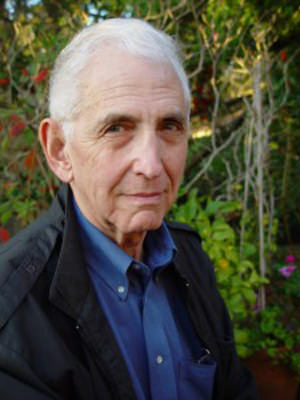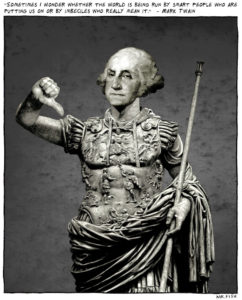Ellsberg: Snowden Made Right Decision by Leaving America
Daniel Ellsberg was able to remain in the US after leaking the Pentagon Papers because, "The country I stayed in was a different America, a long time ago," he argues in an op-ed Sunday Edward Snowden would be greeted with a much different fate, Ellsberg notes, and as a result, he disagrees with those who compare Snowden to him unfavorably because of the NSA whistle-blower's exit from the U .
In an op-ed in The Washington Post on Sunday, whistle-blower Daniel Ellsberg explains why he believes NSA leaker Edward Snowden made the correct decision when he exited the U.S. and sought asylum elsewhere. Ellsberg, who acknowledged comparisons to Snowden, argues that he was able to remain in the U.S. after leaking the Pentagon Papers because, “The country I stayed in was a different America, a long time ago.” The former Truthdigger of the Week notes that Snowden would be greeted with a much different fate and, as a result, Ellsberg disagrees with those who compare Snowden to him unfavorably for leaving.
“When I surrendered to arrest in Boston, having given out my last copies of the papers the night before, I was released on personal recognizance bond the same day,” Ellsberg writes. “Later, when my charges were increased from the original three counts to 12, carrying a possible 115-year sentence, my bond was increased to $50,000. But for the whole two years I was under indictment, I was free to speak to the media and at rallies and public lectures.”
Ellsberg continues: “There is no chance that experience could be reproduced today, let alone that a trial could be terminated by the revelation of White House actions against a defendant that were clearly criminal in Richard Nixon’s era — and figured in his resignation in the face of impeachment — but are today all regarded as legal (including an attempt to ‘incapacitate me totally’).”
Instead, the fate that Snowden would likely meet if he stayed in–or returns to–the U.S. would be completely different from the one that Ellsberg encountered. He points out that there’s little to zero chance that Snowden would even be offered bail. And most likely, if Snowden ever does come back, he will be tossed into jail like another whistle-blower: Pfc. Bradley Manning.
Ellsberg speculates that Snowden would probably be confined to total isolation like Manning, except for a much longer period than the eight months the WikiLeaks source was forced to endure in conditions that the United Nations Special Rapporteur for Torture described as “cruel, inhuman and degrading.” For Ellsberg, that’s reason enough for other countries to grant Snowden’s asylum request.
Ultimately, however, Ellsberg believes Snowden didn’t do anything wrong by releasing top-secret documents about the National Security Agency’s surveillance programs.
“More than 40 years after my unauthorized disclosure of the Pentagon Papers, such leaks remain the lifeblood of a free press and our republic,” Ellsberg writes. “One lesson of the Pentagon Papers and Snowden’s leaks is simple: secrecy corrupts, just as power corrupts.”
Daniel Ellsberg in The Washington Post:
In my case, my authorized access in the Pentagon and the Rand Corp. to top-secret documents — which became known as the Pentagon Papers after I disclosed them — taught me that Congress and the American people had been lied to by successive presidents and dragged into a hopelessly stalemated war that was illegitimate from the start.
Snowden’s dismay came through access to even more highly classified documents — some of which he has now selected to make public — originating in the National Security Agency (NSA). He found that he was working for a surveillance organization whose all-consuming intent, he told the Guardian’s Glenn Greenwald, was “on making every conversation and every form of behavior in the world known to them.”
…As Snowden told the Guardian, “This country is worth dying for.” And, if necessary, going to prison for — for life.
— Posted by Tracy Bloom.
Your support matters…Independent journalism is under threat and overshadowed by heavily funded mainstream media.
You can help level the playing field. Become a member.
Your tax-deductible contribution keeps us digging beneath the headlines to give you thought-provoking, investigative reporting and analysis that unearths what's really happening- without compromise.
Give today to support our courageous, independent journalists.





You need to be a supporter to comment.
There are currently no responses to this article.
Be the first to respond.